The congregation was seated and singing hymns when we arrived, that’s what they do while waiting. We began right away, singing congregational hymns, followed by an opening prayer, and Justin’s sermonette on the topic of steps required to become a disciple, based on Matthew 16:24-26. He spoke about three quarters in Lingala and a quarter in French, but it was enough for me to follow along. It’s common in Kinshasa, for people to move freely back and forth between languages, some things are easier said in one or the other. Numbers for example are given almost exclusively in French. I hear people speaking incomprehensibly and then suddenly comes a string of French numbers, usually prices for something.
There was another hymn and I was introduced for announcements. I extended greetings from the HQ Office, the French Department and my wife, and gave a quick news update. The news has been very good with the ending of fiscal year 2016, and with developments we have on the horizon.
Following my news, there were two pieces of special music, one from the hymnal and one traditional piece. One woman in the congregation, with a powerful voice, would occasionally punctuation the hymns and the special music with ululating. We don’t do that in Dallas (!), but it’s part of the culture here.
My sermon was on the topic of the spirit in man, a clear biblical teaching of which most professing Christians are unaware. Although we had been through our fundamental beliefs before, I was fairly sure that most or all of those present were not really cognizant of this doctrine. They were very excited to hear it, even though the heat made concentration a challenge.
I quickly soaked through my shirt, there was not a dry spot on it, and I soaked through my silk tie, which may not survive the experience, the jury’s still out, and even soaked large stains in my trousers, although they were not completely wet. It was hot and very humid. I find though, that once one is good and wet, the heat is less noticeable. I did have to keep mopping my brow to keep from dripping in my Bible, which causes the pages to bunch. I have a number of memorable bunchy pages. The sermon was well received and several people thanked me for it.
Right after services I held several sessions of baptismal counseling, one for those in the very beginning of the process, another for those who had already had a session or two, and then again for a beginner who hadn’t come the first time. This took 90 minutes, most of which was spent going through Romans chapters six through eight, a passage I always cover with people preparing for baptism. Chapter six in particular is important for that topic.
Following this I had a meeting with six of the congregational leaders to respond to what they call in French their doléances, which we would probably translate grievances, but it mostly just means things they have on their minds. One man asked about organizational structure, he’s hoping to be more involved. Several others were really hoping for personal financial help, they wanted to submit income-generating work "projects" that the Church would finance for them. I’ve done this over the years, and find that they don’t work. I explained as gently as I could that of all the projects I’ve helped finance over the years, the percentage of those that worked as planned and promised was exactly zero. It ends up being an elaborate and quite inefficient way to receive financial help, although it does give them something to do.
Some blasts from the past (these people are not in COGWA now, the most egregious cases went elsewhere....):
- I offered to helped one man with a disability learn to be a barber, so could support himself. I had asked for local advice to find something feasible for him. But he didn’t want to be a barber; it was low status, and too much work (he thought). Instead he wanted to sell diesel fuel, just sit and sell, no effort at all (he thought). Of course that would have required huge overhead (a big tank, a starting supply of fuel, a costly location). He had no experience, and I didn’t have that much assistance to offer anyway. In the end he refused the barber training, and preferred just to continue as he was getting by as best he could with no skills.
- We supplied one member with a decorticator (a machine that removes shells from nuts). We were assured this was a sure thing. But almost immediately it was not maintained and quickly broke down, and there was no real interest in fixing it. When it broke, the person simply lost interest.
- A church congregation asked us to buy them a large garden plot, on which they would plant food to feed their families. We found a good plot, not too expensive, well located, and bought it. Then we found most people were hoping everyone else would work, but they preferred not to in the tropical heat (which really is hard work!). Unbeknownst to me they eventually farmed out the farm to other workers and just collected a percentage of the harvest. A little money with no work is better than much more money with hard work.
- One member asked earnestly for a motorcycle so he could drive it as a taxi. He could just make ends meet if he had that, he said. We supplied a few hundred dollars for a Chinese motorcycle. Next time I visited I asked about it. It wasn’t there; he had rented it out to someone else to do the work. Again a little money and no work….
The educational level is generally (though not exclusively) quite low, so people don’t have the knowledge or training to run businesses, often even simple ones, and if they’re bankrolled for free, they don’t really value the investment, it’s just free money. Sometimes, once someone get the money in hand, he spends it on something other than the project proposed. This is not overt dishonesty; it is rather a combination of inexperience about the world, naivete, and different cultural expectations. This last is very important; there is a totally different cultural framework in sub-Saharan Africa. That’s my experience of 20 plus years. Money is a hard thing with which to deal in Africa (and the rest of the world too of course).
On the other hand I know of many members who started their own business small and slowly (baking doughnuts or other breads, knitting sweaters, growing cash crops), and worked their way up without help and they’re doing quite well.
I’m reminded of Proverbs 13:11 “Money that comes easily disappears quickly, but money that is gathered little by little will grow” (New Century Version).
So, I reminded the men that the Bible teaches that church help is supposed to go to widows and orphans and the able bodied people should work (2 Thessalonians 3:10). Millions of people are getting by in the Congo. No one is starving in Kinshasa. I explained that in cases of sickness or injury or people going hungry, the Church will do what it can, but we can’t subsidize able-bodied men who are looking mostly for a less-difficult life. This would apply to everyone in Africa, though granted the situation is especially difficult in Kinshasa. One of the men replied, “Well don’t help everyone, just help us!” There is a strong feeling here that life has been especially unfair to the Congolese.
We read Matthew 6:33 and the preceding verses. I encouraged them to ask God to open doors for them so they could earn an adequate living to feed their families. If He gives us a responsibility, He will give us the wherewithal to fulfill it, if we trust Him and seek His help. We’re supposed to pray for our daily bread, not monthly or yearly and so on. They listened patiently but I don’t think all were convinced.
“Well you have to give us something” one of them concluded, “my wife is expecting something...”
I did leave a little something for each of them because in their culture they would have a very hard time understanding if I did not, and we’re working in their culture here. It’s certainly not wrong to give a little token of our esteem for them without making other commitments. I usually have an envelope with me to cover such needs.
We'll keep working on this.
We said goodbye all around and four of us loaded into the little Toyota. We drove 40 minutes out to the site of an outlying Bible Study. At the end we had to leave the car and walk several blocks on streets and paths the car could not navigate. Finally we arrived at the compound where a church family lives. It’s located on very low, flood grounds. During the rainy season, at much as six inches of water can swamp the streets and homes here; water inside and out. This can be a major source of disease of course, standing dirty water transmits all sorts of nasty stuff, including cholera, but this is their home area and the area they can afford. They all have plastic Wellingtons to wear when the water rises.
We sat and talked with them for a few minutes and discussed the situation. Perhaps we can find a lot to rent on higher ground where they can meet for Bible Studies. Transportation to and from services at the central hall can cost two dollars per person, which is very expensive for them, and makes it impossible for whole families to attend. We will look into this further.
We walked back to the car and drove back toward the center, stopping at the home of Richard, an older member who has an enlarged prostate. The compound of his little house was full of a huge broken down van. Children had built a miniature football pitch in the dirt, and were pretending to play a match with a God’s eye view. We stepped around the van and over the children and into the house which hadn’t been painted in decades. Like most houses here, it has devolved into a dull gray, smudged with red mud and charcoal.
We sat in his living room and I ask about his health. The prostate problems are improving with treatment, but he hasn’t been able to attend services for quite some time. He asked me to pray for him and I was happy to ask God’s blessing and healing, and then we took our leave.
We finally drove back to the hotel, and walked out to the small garden around the pool. They are more comfortable outside in the heat rather than inside in the air-conditioning. We discussed needs and wishes of which there are many. Sometimes there’s what I call a “hail Mary” approach, throw a bunch of requests at me and see if anything sticks.
- Could we air-condition the hall? No, that’s way too expensive, how about a couple of floor fans? OK. (It really is hot, as my shirt and tie can attest).
- Could you buy us a few thousand dollars’ worth of motorcycles so we can visit members and run a taxi service to make money? Sorry no; we’ll provide a little transportation budget.
- Could you buy us 50 more plastic chairs for church services and the outlying Bible Studies? Yes, we can do that.
- Can you buy us a computer and Internet card for the office so we can download church communications without the trip to a cyber-café, and store the weekly newsletters? That’s reasonable, we can help with that. I gave them detailed instructions on how to care for a laptop – they’re tougher than desktops – in equatorial conditions (heat, humidity, wild electrical fluctuations, and dust).
I handed over the cash that we’ve agreed is appropriate and got a signed receipt. We relaxed with a soft drink as we finished up. As sunset approaches, I walk them to the front entrance and say until next time to everyone but Justin, who will accompany me to the airport at 07:00 tomorrow morning.
I skipped lunch completely today, but I haven’t much appetite for dinner. It’s probably the heat, and I won’t complain. Hopefully I will sleep well tonight; this is about the night when jet-lag could catch up with me. The first few nights, one is very tired from the trip. It’s about night three that I find I can’t sleep through. We’ll see how it goes. Tomorrow will be, God willing, my onward trip to Cameroon.

 Kinshasa, Kinshasa, Congo - The Dem. Repub.
Kinshasa, Kinshasa, Congo - The Dem. Repub.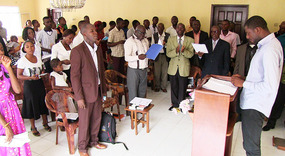
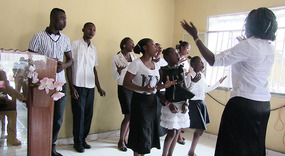
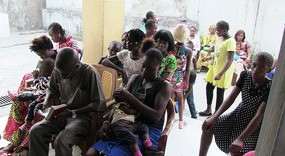
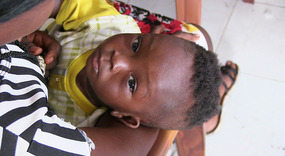
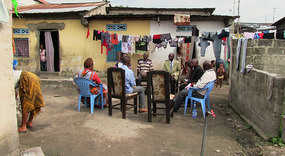
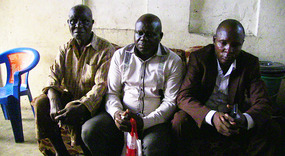






mary hendren
2017-01-23
Thanks for your comments on the Sabbath and Bible study. It's encouraging to hear that several people want to be baptized and have begun counseling and preparing. Negotiations for funding realistic needs and turning down unreasonable ones must be difficult. As you mentioned the needs are great and the cultural expectations are different. But it seems there was a good resolution. We pray for your safe travels and successful contacts.